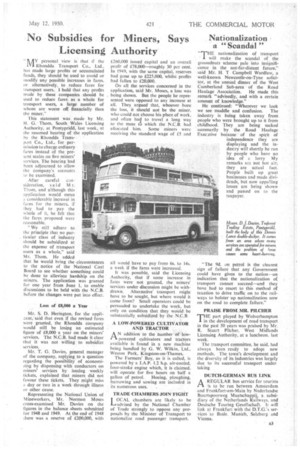No Subsidies for Miners, Says Licensing Authority
Page 37

If you've noticed an error in this article please click here to report it so we can fix it.
poenrds do an a 1 T vr ai enws i r ts t hcaot if Ltd., has made large profits or accumulated funds, they should he used to avoid or modify any possible increases in fares. or alternatively, to reduce fares for transport users. / hold that any profits made by these companies should be used to reduce fares as a whole for transport users, a large number of whom are worse off financially than the miner."
This statement was made by Mr. H. G. Thom, South Wales Licensing Authority, at Pontypridd, last week, at the re-sumed hearing of the application by the Rhondda Trans port Co., Ltd.. for permission to charge ordinary fares instead of the present scales on five miners' cervices. The hearing had been adjourned to allow he Company's accounts 10 be examined.
After careful con
sideration, said M r. Thom. and although this application would mean a considerable increase in fares for the miners. if :hey had to pay the whole of it, he felt that the fares proposed were reasonable.
"We still adhere to he principle that no particular class of industry should be subsidized at the expense of transport users as a whole," said Mr. Thom. He added that he would bring the circumstances to the notice of the National Coal Board to see whether something could he done to alleviate hardship on the miners. The application was granted for one year from June I. to enable discussions to be held with the N.C.B. before the changes were put into effect.
Loss of /8,000 a Year
Mr. S. D. Herington, for the applicant, said that even if the revised fares were granted, the Rhondda company would still be losing an estimated figure of £8,000 a year on the miners' services. The N.C.B. had made it clear that it was not willing to subsidize services.
Mr. T. G. Davies, general manager of the company, replying to a question regarding the possibility of economizing by dispensing with conductors on miners' services by issuing weekly tickets, explained that miners did not favour these tickets. They might miss a day or two in a week through illness or other cause.
Representing the National Union of Mineworkers, Mr. Norman Moses cross-examined Mr. Davies on the figures in the balance sheets submitted for 1948 and 1949. At the end of 1948 there was a reserve of £200,000, with 1260,000 issued capital and an overall profit of £78,000—roughty 30 per cent. In 1944, with the same capital, reserves had gone up to £225,000, whilst profits had fallen to £20,000.
On all the services concerned in the application, said Mr. Moses, a loss was , being shown. But the people he represented were opposed to any increase at all. They argued that, whoever bore the loss, it should not be the miner. who could not choose his place of work, and often had to travel a long way to the mine t5 which the N.C.B. had allocated him. Some miners were receiving the standard wage of £5 and all would have to pay from 6s. to 14s. a week if the fares were increased.
it was possible, said the Licensing Authority, that if some increase in fares were not granted, the miners' services under discussion might be withdrawn. Alteinative transport might have to be sought, but where would it come from? Small operators could be persuaded to undertake the work, but only on condition that they would be substantially subsidized by the N.C.B.




























































































